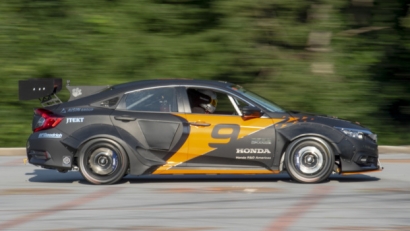
Engineered, built and tested by Clemson automotive engineering students, Deep Orange 9 combines high-performance, ultra-tough racing features with a clean, fuel-efficient hybrid powertrain, advanced technical innovations, a lightweight/high-strength steel structure and highly dynamic handling and acceleration.
“Deep Orange 9 was a platform for Clemson’s students to develop a concept vehicle that fuses Honda’s challenges to create a carbon-sustainable society while providing customers joy and freedom of mobility,” said Duane Detwiler, director of HRA’s Strategic Research Operations division. “We also believe these students can make significant contributions as future HRA associates in helping Honda realize its long-term vision for mobility.”
As part of the graduate automotive engineering program at CU-ICAR, select students receive the opportunity to create and build a concept vehicle sponsored by industry. The project showcases advanced technologies and provides students an opportunity to work directly with automotive industry partners. This innovative, project-based learning program produces highly capable automotive engineers by immersing them in the world of vehicle manufacturers and suppliers.
“Our program requires students to make highly technical decisions quickly while also keeping the top-level project goals such as safety, performance, customer usability and compressed deadlines in mind,” said Robert Prucka, Kulwicki Endowed Professor in Motor Sports Engineering at CU-ICAR, who led the project.
The extreme engineering behind motorsports is often a test bed that pushes the boundaries of consumer vehicle technology. Rallycross vehicles require extreme power and agility on a variety of road surfaces, needing explosive acceleration, higher top speeds and more responsive handling and braking than their production-line counterparts. Such conditions require even more attention to driver safety, which makes rallycross the perfect medium to explore the next generation of consumer vehicles.
“Cars are increasingly complicated systems, and industry today needs associates who understand the different ways these systems come together to make a unique, competitive product,” said Chris Paredis, BMW Endowed Chair in Automotive Systems Integration and Deep Orange director. “Deep Orange is a way to teach systems integration to students in a low-risk environment that allows students to innovate, fail fast and get up to speed quickly in ways that prepare them for success in industry.”
The Deep Orange 9 vehicle was engineered around four primary goals: Improve fuel economy, reduce emissions, match current rallycross race performance, and minimize total vehicle operating costs.
Hands-on learning is critical to the success of CU-ICAR graduates, and Deep Orange 9 has a special future as a “living laboratory” and systems integration education tool for future Clemson Automotive Engineering cohorts. Students will continue to refine and improve the vehicle as part of their rigorous curriculum, including work on control systems, powertrain, vehicle dynamics and suspension.
Deep Orange 9 was also supported by Aisin Group and JTEKT Corporation as Leadership Sponsors, BFGoodrich as Track Sponsor and Red Bull and the Specialty Equipment Market Association (SEMA) as Marketing Sponsors. Deep Orange 9 also partnered for unique concussion research in collaboration with the Spartanburg Regional Healthcare System Sports Medicine Institute, DriveSafety Inc. and EyeTracking Inc.

